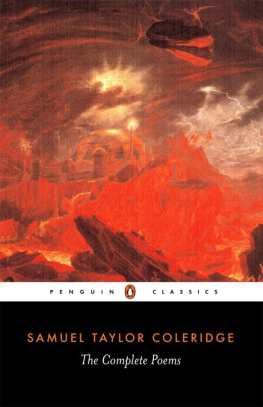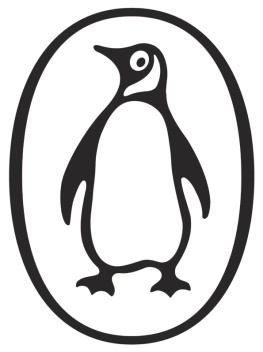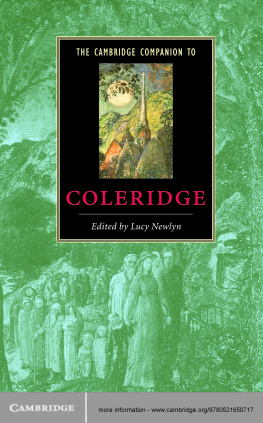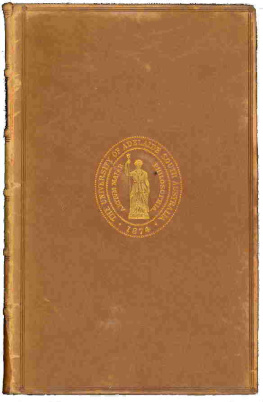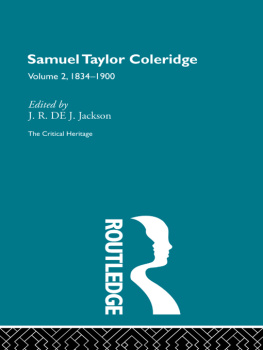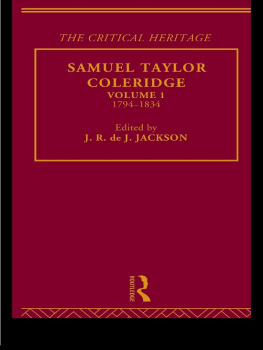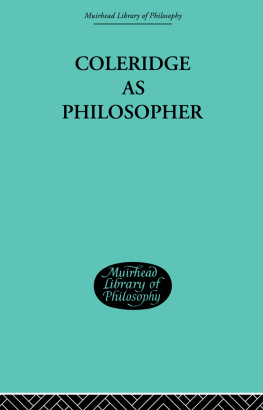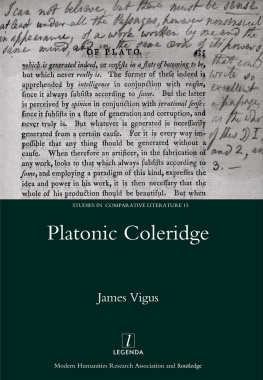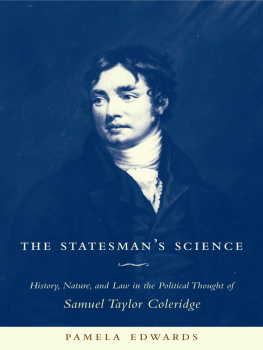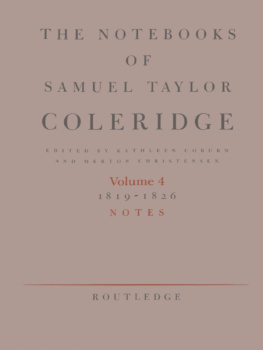Samuel Coleridge - The Complete Poems of Samuel Taylor Coleridge
Here you can read online Samuel Coleridge - The Complete Poems of Samuel Taylor Coleridge full text of the book (entire story) in english for free. Download pdf and epub, get meaning, cover and reviews about this ebook. year: 2004, publisher: Penguin Books, genre: Detective and thriller. Description of the work, (preface) as well as reviews are available. Best literature library LitArk.com created for fans of good reading and offers a wide selection of genres:
Romance novel
Science fiction
Adventure
Detective
Science
History
Home and family
Prose
Art
Politics
Computer
Non-fiction
Religion
Business
Children
Humor
Choose a favorite category and find really read worthwhile books. Enjoy immersion in the world of imagination, feel the emotions of the characters or learn something new for yourself, make an fascinating discovery.
- Book:The Complete Poems of Samuel Taylor Coleridge
- Author:
- Publisher:Penguin Books
- Genre:
- Year:2004
- Rating:3 / 5
- Favourites:Add to favourites
- Your mark:
- 60
- 1
- 2
- 3
- 4
- 5
The Complete Poems of Samuel Taylor Coleridge: summary, description and annotation
We offer to read an annotation, description, summary or preface (depends on what the author of the book "The Complete Poems of Samuel Taylor Coleridge" wrote himself). If you haven't found the necessary information about the book — write in the comments, we will try to find it.
The Complete Poems of Samuel Taylor Coleridge — read online for free the complete book (whole text) full work
Below is the text of the book, divided by pages. System saving the place of the last page read, allows you to conveniently read the book "The Complete Poems of Samuel Taylor Coleridge" online for free, without having to search again every time where you left off. Put a bookmark, and you can go to the page where you finished reading at any time.
Font size:
Interval:
Bookmark:


PENGUIN ENGLISH POETS
GENERAL EDITOR: CHRISTOPHER RICKS
COLERIDGE: THE COMPLETE POEMS
SAMUEL TAYLOR COLERIDGE was born in 1772 at Ottery St Mary, Devon, the youngest son of a clergyman. A precocious reader and talker as a child, he was educated at Christs Hospital School, London, where he began his friendship with Charles Lamb and wrote his earliest poems, and Jesus College, Cambridge. In 1794 he met Robert Southey and together they planned Pantisocracy, an ideal community to be founded in America, but the project collapsed after a quarrel. Coleridges poems were published in the Morning Chronicle , and in 1795 he wrote The Eolian Harp for Sara Fricker, whom he married in the same year, although the marriage was an unhappy one. He first met Dorothy and William Wordsworth in 1797 and a close association developed between them. Coleridge wrote his famous Kubla Khan in the same year, followed in 1798 by Frost at Midnight. In 1799 he and Wordsworth published the Lyrical Ballads , which marked a conscious break with eighteenth-century tradition and included one of Coleridges greatest poems, The Rime of the Ancient Mariner . During a visit to the Wordsworths in 1799 he met Sara Hutchinson, who became his lifelong love and the subject of his Asra poems. In the following year Coleridge and his family settled at Greta Hall, Keswick, where he wrote the second part of Christabel , begun in 1798, and also became addicted to opium. In 1804 he separated from his wife and spent the following years in the Mediterranean or London, returning in 1808 to live with the Wordsworths in Grasmere. In 1809 he established The Friend , a political, literary and philosophical weekly journal, which he published regularly over the next year. After a disagreement with Wordsworth in 1810 Coleridge left the Lake District for ever, centring his life thereafter in London, where he gave his Shakespeare Lectures . He presented his literary and philosophical theories in the two-volume Biographia Literaria , published in 1817, and collected his poems in Sibylline Leaves . In an attempt to control his opium addiction he entered the household and care of Dr James Gillman at Highgate in 1816. Here he was to remain for the last eighteen years of his life, writing a number of late confessional poems and prose works, including Aids to Reflection , published in 1825. Coleridge died in 1834 having overseen a final edition of his Poetical Works .
Poet, philosopher and critic, Coleridge stands as one of the seminal figures of his time. William Hazlitt wrote: His thoughts did not seem to come with labour and effort; but as if borne on the gusts of genius, and as if the wings of his imagination lifted him from off his feet, and Wordsworth called him the only wonderful man I ever knew.
WILLIAM KEACH was born in Robstown, south Texas. He was educated in the local schools, then studied at the universities of Texas (Austin), Oxford and Yale. From 1970 until 1985 he taught in the English Department at Rutgers University, and since 1986 he has been Professor of English at Brown University in Providence, Rhode Island. He has published books and articles on Renaissance and Romantic literature and culture and he is currently writing a book about language and politics in the English Romantic period.
SAMUEL TAYLOR COLERIDGE
The Complete Poems
Edited by WILLIAM KEACH
PENGUIN BOOKS
PENGUIN BOOKS
Published by the Penguin Group
Penguin Books Ltd, 27 Wrights Lane, London W8 5TZ, England
Penguin Books USA Inc., 375 Hudson Street, New York, New York 10014, USA
Penguin Books Australia Ltd, Ringwood, Victoria, Australia
Penguin Books Canada Ltd, 10 Alcorn Avenue, Toronto, Ontario, Canada M4V 3B2
Penguin Books(NZ) Ltd, 182190 Wairau Road, Auckland 10, New Zealand
Penguin Books Ltd, Registered Offices: Harmondsworth, Middlesex, England
This edition first published 1997
10 9 8 7 6 5 4 3 2 1
Editorial matter copyright William Keach, 1997
All rights reserved
The moral right of the editor has been asserted
Except in the United States of America, this book is sold subject
to the condition that it shall not, by way of trade or otherwise, be lent,
re-sold, hired out, or otherwise circulated without the publishers
prior consent in any form of binding or cover other than that in
which it is published and without a similar condition including this
condition being imposed on the subsequent purchaser
CONTENTS
Sonnets on Eminent Characters:
Sonnets Attempted in the Manner of Contemporary Writers:
INTRODUCTION
At first glance it might appear to be easier to produce a complete and textually accurate edition of the poems of Coleridge than of the other canonically dominant Romantic poets. He issued three editions of his Poetical Works near the end of his life in 1828, in 1829, and (with the help of his nephew and son-in-law, Henry Nelson Coleridge) in 1834, the year of his death. Between 1834 and 1880 seven editions containing previously unpublished poems appeared, the most important of which were edited by H. N. Coleridge, by Coleridges daughter Sara, and then by his youngest son Derwent all of whom had intimate knowledge of Coleridges attitudes towards his verse and distinctive access to his manuscripts. James Dykes Campbell in 1893 and Ernest Hartley Coleridge (the poets grandson) in 1912 published annotated scholarly editions of the poems and plays that represent, according to the Modern Language Associations English Romantic Poets: A Review of Research and Criticism (1985), specimens of the best of late nineteenth-century editorial practice. An unusually full and authoritative basis for a good modern edition had been established by the beginning of the twentieth century.
But several complications arising from Coleridges characteristic habits as a writer of verse stand between the basis laid by these earlier editions and the kinds of editions we need today. Coleridges notebooks and letters are full of verse unpublished by him and by his subsequent editors. Much of this verse is fragmentary; much of it is translated or adapted from other writers. But it constitutes, in any case, writing that many readers of Coleridges poetry want to have ready access to. Furthermore, early in his career Coleridge published a number of poems in magazines and newspapers that he never included in collected editions. The fact that Coleridge never collected these poems is important. In some instances their textual status is ineluctably suspect because no manuscript version is known to exist and because they were never published under Coleridges direct editorial supervision. These circumstances do not of course mean that poems of this kind should be excluded from editions that aim to meet reasonable standards of completeness.
But the most important and interesting complication that an edition of the poems has to contend with is Coleridges relentless revising. Sometimes he wrote several different versions of what he and we want to think of as the same poem; sometimes he rewrote passages or added new passages for subsequent published versions, or included such passages in letters or notebooks; sometimes he revised or added passages in his own or someone elses copy of his poems. This aspect of Coleridges poetic practice is the major concern of Jack Stillingers recent Coleridge and Textual Instability (1994). Concentrating exclusively on the facts and issues raised by the existence of a great many different versions of Coleridges seven most widely read poems (The Rime of the Ancient Mariner, Kubla Khan, Christabel, The Eolian Harp, This Lime-Tree Bower my Prison, Frost at Midnight and Dejection: An Ode), Stillinger argues that Coleridge produced a new definitive version, the final text that he intended to stand at the moment, every time he revised a text. We have more versions of Coleridges poems than we have for the works of most other major writers, Stillinger contends; the instability of Coleridges texts is not primarily a function of missing materials but of a surplus of materials.
Next pageFont size:
Interval:
Bookmark:
Similar books «The Complete Poems of Samuel Taylor Coleridge»
Look at similar books to The Complete Poems of Samuel Taylor Coleridge. We have selected literature similar in name and meaning in the hope of providing readers with more options to find new, interesting, not yet read works.
Discussion, reviews of the book The Complete Poems of Samuel Taylor Coleridge and just readers' own opinions. Leave your comments, write what you think about the work, its meaning or the main characters. Specify what exactly you liked and what you didn't like, and why you think so.

